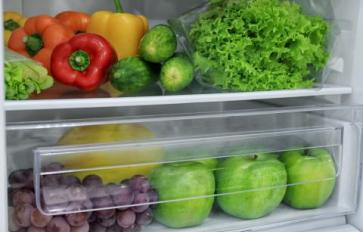
Did you know that 33 million tons of food enters landfills annually?
Nearly 40% of food produced in the United States is wasted annually.
150,000 tons of food is wasted daily in the U.S., which equates to about a pound per person.
This figure equates to approximately 165 billion dollars and could feed 25 million Americans!
So, why are we throwing away this food, this money, this nourishment when about 1 in 6 people are facing hunger?
Anthony Bourdain’s documentary film on food waste, Wasted!, examines how food waste is affecting the country, your community, and you. You can be part of the solution! Check out these ten ways to reduce food waste in your home as you think locally and act globally for the reduction of food waste in our country.
1. Understand expiration dates.
“Expiration” dates take many different names and are chosen by the manufacturer for two main reasons: to protect them and to retain consumers. Most food “expiration” dates are self-imposed for these reasons. To better understand “use by,” “sell by,” and “best by,” along with other food labels, read here. You could be throwing out food that still has a few healthy days remaining.
2. Check expiration dates when shopping.
Once you understand expiration and sell by dates well, check them while shopping for the week’s groceries. The freshest (the items with the longer shelf life) are, logically, at the back of the shelf or rack. For example, knowing that I don’t drink milk very quickly but love a splash in my coffee, I reach for the milk jug towards the back of the cooler…and then follow #3 below.
3. Use the smell test.
To accompany a better understanding of expiration dates, utilize the “smell test,” which is just what it sounds like: smell a food item if you are questioning its freshness. The human body has been trained over time (both socially and culturally) to react to smells that are not quite right. When in doubt, go with your gut [feeling about a smell]!
4. Choose the right quantity.
First, start by having a snack before going to the grocery store. Research shows that shopping—any type—on an empty stomach leads to impulsive choices. When your body is satiated, it also translates to a mental state in which you can make better decisions about how much food you truly need for the week. Choose a half a pound of cold cuts you’re sure you’ll finish rather than a pound you may not finish before they go bad, for example.
5. Buy seasonal (& local, if possible!) foods.
Opting for fruits and vegetables that are in season is easier on your wallet and generally means that the food is fresher. Produce that is in season will not expire as fast as, say, a mediocre melon that you find out of season. And, seasonal foods are seasonal for a reason…in the winter, the body craves energy found in the sugars, vitamins, and minerals in root vegetables and squash, for example. Learning how to properly store [seasonal] foods may extend the life of fresh items, also.
6. Designate an “Eat First” spot in the fridge.
Choose a part of the fridge or designate a container for items that should be eaten first before other things in the fridge. Labeling this place or space with an “Eat First” tag can help. The Rethink Food Waste project in Bend, Oregon, used the “Eat First” card in a pilot program with community members. Print out a copy of their “Eat First” card at the link above and reorganize the fridge!
7. Meal plan.
It’s not as time-consuming as it sounds! Take a look in the fridge and pantry, and consider how to incorporate items already there with maybe one or two additional items to purchase. For example, reuse leftover rice or pasta by adding them to a soup the following night or buy a bag of sweet potatoes and try all of these recipes. If you’re really stuck, check out platejoy or any of these meal-planning apps to encourage forward thinking to reduce food waste.
8. Freeze it!
Is that banana in the basket getting brown? Freeze it! Made too much soup? Freeze it for a quick and easy meal. Worried that the lemon will dry out soon? Juice it! There are many ways to preserve food before it goes bad. Learn to blanch any vegetable, and toss it in the freezer to use at a later date.
9. Compost your scraps.
To further reduce food waste in your home, create a compost bin if you haven’t already. If food is not fit to consume, recycle it to the earth. Meat and dairy is not ideal for compost, but if fruits and veggies have really spoiled, find the compost bin before dumping them in the trash. Did you know that 97% of wasted food ends up in the landfill rather than in the compost? There is no reason to be mixing organic matter with non-organic matter in the landfill.
10. Clean out the fridge weekly.
Designate a day of the week—or month, if that is more manageable—to clean out the fridge, moving items to the “Eat First” area, and then evaluating for compost, if necessary. Ideally, cleaning out once a week will lead to less food entering either of those locations (“Eat First” or compost bin), and you’ll establish a routine conducive to creating less food waste.
BONUS: Share it with an animal!
Since meats and dairy aren’t best for compost, see if a furry friend in your home may want to munch on that little chunk of chicken or that soggy cereal! Everyone has his or her own preferences, but I feed the dog a bit of bacon grease with her kibble to avoid putting it in the trash (…and to keep the upper hand). Perhaps you could even share food with a neighbor with chickens, sheep, or other animals. I brought my monster zucchini to our neighbor’s ducks, for example.
If you want to go even further, you can always donate to your local food shelf. Canned items don’t go bad nearly as quickly, but don’t let them gather dust in the back of the pantry too long! Designate one day of the month to clean out and bring an item or two to someone else who would appreciate a meal.
And, if visiting your local food shelf does not offer some perspective about why reducing food waste is a necessary endeavor, I don’t know what will…








